This post has already been read 2217 times!
I covered Chicago City Hall and every Chicago Mayor from Richard J. Daley to Richard M. Daley and I know from interviewing the seven mayors during that period that being mayor is no easy job. But Daley’s successor Mayor Rahm Emanuel’s office has repeatedly turned down interview requests from me and while I understand the challenges Mayor Emanuel faces, he needs to open his door more. It’s not an easy job being mayor but it is made much worse when you close the door to the ethnic and community news media
Listen to the podcast using this widget or click here.
By Ray Hanania
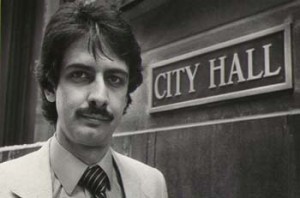
Ray Hanania, City Hall Reporter, (1976-1992)
I covered seven Chicago mayors, starting with Chicago Mayor Richard J. Daley and going full steam with his successor Chicago Mayor Michael A. Bilandic.
The job really didn’t get interesting until Jane Byrne. She didn’t defeat the Chicago Machine. She conquered it.
Harold Washington wasn’t here long enough. Some African Americans believe he was poisoned.
Eugene Sawyer was a gentle CEO who never got a chance to really rule. David Orr was just acting, for one week.
Then there was the Daley dynasty. I met Richard J. Daley before he died and covered his son. Rich, who was elected to, ironically, represent stability and racial calm in the wake of the anti-Washington bullying. Turns out Daley was all about clout.
I interviewed all of them, and have been called a lot of names by them during my 17 years at City Hall.
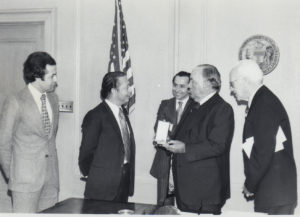
Mayor Richard M. Daley in 1976 at the mayor’s City Hall office with the Washington Ambassador from Morocco. My first interview with Mayor Richard J. Daley. Photo by Ray Hanania 1976
Yet, it wasn’t until recently that I finally got a chance to meet Rahm Emanuel. He was the one I thought hated me the most.
I wasn’t at the Hall when Emanuel was first elected. His office denied my requests to interview him. Maybe it was because I am Palestinian Arab American. Mayor Emanuel is Jewish. In case you don’t have Internet, Arabs and Jews are killing each other in the Middle East and they don’t get along any better in Chicagoland.
It’s not Emanuel’s fault. The post 9/11 hysteria against Muslims and the utter lack of education by Americans of who Muslims and Arabs really are should explain a lot.
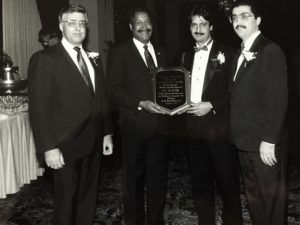
Chicago Mayor Eugene Sawyer at an American Arab event in 1989
So I got perturbed when Emanuel reorganized the city’s Human Relations Commission eliminating the Advisory Commission on Arab Affairs, which was created by Washington and strengthened by Daley. Even though the group was a useless, do-nothing collection of dysfunction, it was important because anti-Arab groups close to Emanuel had been trying to do just that for years.
Suddenly American Arabs who toiled and loved Chicago. Paid their taxes, had kids in the city schools,, served in the military, were pushed out.
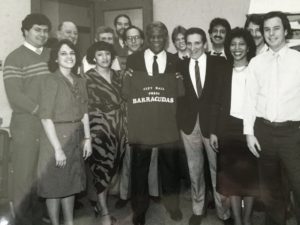
Mayor Harold Washington with the City Hall reporters in 1985 holding up a t-shirt he printed for the reporter baseball team The Barracudas
But there is an underlying issue. Arabs are a minority in the “Muslim” World and are often pushed out. Arabs are considered “Muslims” when things go bad, but are ignored when things go good.
Christian Arabs like myself suffer the most. We’re excluded when people come together to sing Kumbaya. And that’s what it seemed like when Emanuel reached out to “Muslims” but closed his door to Arabs.
I can’t blame Emanuel for all the problems. He has enough on his hands trudging through decades of city debt that has dragged down the Chicago Public schools, dragged transportation, hobbled the city’s economy, and fueled rising crime. The pressures on the Chicago Police are enormous.
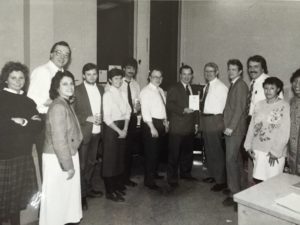
Mayor Richard M. Daley and the City Hall press corp members in 1990
Yet, I always felt that being Jewish, Emanuel might understand the special problems facing American Arabs who have been historically excluded from government services and programs. It’s gotten worse under him.
I know Mayors hate to be criticized. Bilandic ignored people like me, which is why he really lost. Byrne called me “scum,” after accusing me of being Daley’s lackey. Washington said I was “too White” when I questioned his policies. Sawyer was dazed and confused. And Daley, the son, expected fealty, which I wouldn’t give.
Emanuel wanted to be mayor of Chicago. And I expected more. Not really knowing him, it was easy for me to criticize, though I supported both his elections in 2011 and in 2015.
We finally got a chance to kibitz a little last week when Emanuel hosted an Iftar, breaking of the fast during Ramadan, for Chicago’s Muslims.
I found I actually like him. He said strong words against racism and hate, and vowed to make Chicago inclusive, his words.
Emanuel needs to overcome the past discrimination against Arabs to make Chicago truly inclusive, and understand we’re no different than anyone else.
(Ray Hanania is an award winning former Chicago City Hall reporter and political columnist. Email him at [email protected].)
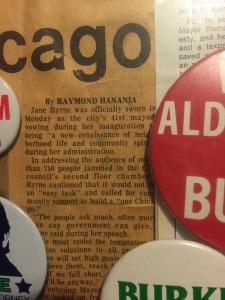
Copyright 2014 Ray Hanania. All rights reserved. Permission to republish with full credit to Ray Hanania and Illinois News Network www.IllinoisNewsNetwork.com
One of the memories I have is meeting the great Mike Royko in 1980 during one of the Chicago Headline Club Peter Lisagor Awards ceremonies. Royko and I spoke in the lobbyand he autographed his book “Boss,” which explored the intimacies of the administration of the late Mayor Richard J. Daley.
I remember Royko, who said he enjoyed my column in the then Daily Southtown (The Political Grapevine), responding to a question about how he handled mayor’s who refused to talk to him. He said that when you write a column and a politician doesn’t speak with you, it’s a “license to kill.” What he meant was that as a columnist, you could write the story or perspective as you saw it based on what you knew and after giving the politician the opportunity to respond, and if the politician refused to comment, your story would stand without challenge.
A politician who responded and spoke with columnists and reporters had the upperhand in tempering the perspective and had the opportunity to counter a perspective the column might otherwise take. It could definitely impact how the column is written, he said.

Ray Hanania and Harry Golden Jr., in the City Hall press room. Golden was Hanania’s journalism mentor and he helped get Hanania hired in 1985 at the Chicago Sun-Times.
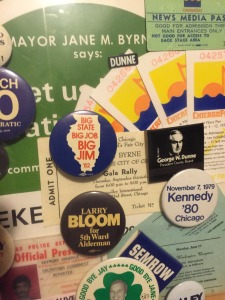
Copyright 2014 Ray Hanania. All rights reserved. Permission to republish with full credit to Ray Hanania and Illinois News Network www.IllinoisNewsNetwork.com
RayHananiaINN
Hanania covered Chicago political beats including Chicago City Hall while at the Daily Southtown Newspapers (1976-1985) and later for the Chicago Sun-Times (1985-1992). He published The Villager Community Newspapers covering 12 Southwest suburban regions (1993-1997). Hanania also hosted live political news radio talkshows on WLS AM (1980 - 1991), and also on WBBM FM, WLUP FM, WSBC AM in Chicago, and WNZK AM in Detroit.
The recipient of four (4) Chicago Headline Club “Peter Lisagor Awards” for Column writing. In November 2006, Hanania was named “Best Ethnic American Columnist” by the New American Media;In 2009, he received the prestigious Sigma Delta Chi Award for Writing from the Society of Professional Journalists. Hananiaalso received two (2) Chicago Stick-o-Type awards from the Chicago Newspaper Guild, and in 1990 was nominated by the Chicago Sun-Times for a Pulitzer Prize for his four-part series on the Palestinian Intifada.
Latest posts by RayHananiaINN (see all)
- “Law and order” today and 50 years ago - July 29, 2016
- Morton High school named “District of the Year - July 28, 2016
- Orland Fire honors officer for saving boy’s life - July 27, 2016





